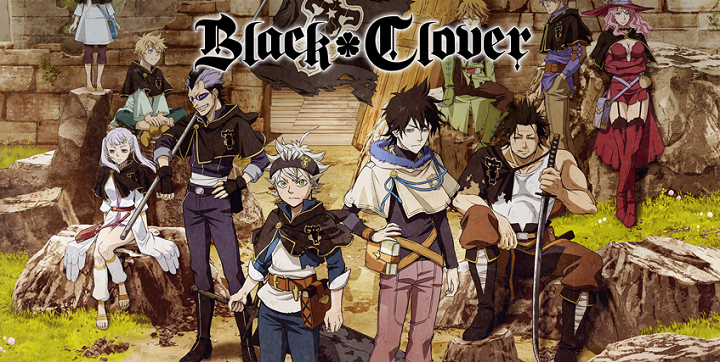
Bleach. Naruto. One Piece. The Big Three, a legendary trio of Shonen anime/manga that dominated the community for over a decade. Properties so successful that they continue to inspire creators to this day. However all things must one day end and only One Piece remains in its original form. The mangaka Eiichirou Oda is still chugging along to this day. As Bleach ran its course, My Hero Academia rose to fill its shoes. And as Naruto: Shippuden wrapped up in 2017, the manga ending 3 years prior, the question became: What would take its place? Running for over 150 episodes straight, there is one series that has clearly made a play for that position. But does it succeed? This is the story of Black Clover, its first 151 episodes and the troubled production found within. Is it worth it? Should you give it a shot? Let’s find out together.
Welcome to the first, and possibly only, edition of Shonen Check-In. How’s that for a pretentious start eh? Had to get people hooked in early. Don’t worry, this isn’t that kind of post. The long and short of it is that, for various reasons, I decided to catch up on the first 151 episodes of Black Clover. Like many I dropped it early back in 2017, in the first cour in fact, maybe even the first episode. Between Asta’s screaming, the questionable production and the almost… blatantly generic plot, I had 0 interest in another new Shonen. But over these last 3 years Black Clover has somehow survived and the fan base has only grown. They sing its praises, they keep saying “It gets good, it gets good!” Well I am here to check that assertion. I watched Black Clover so you don’t have to. But maybe… maybe you should.
(Disclaimer: This is not a review, there is no number score, I just wanted to talk about Black Clover damnit.)
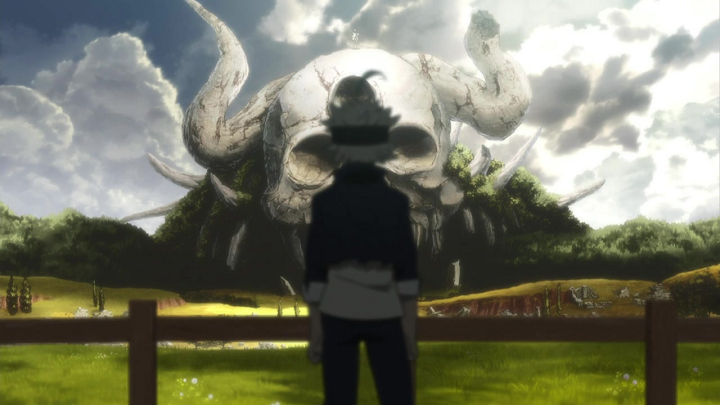
What is Black Clover?
You most likely already know the basics: Fantasy world, magic knights, the infamous “this world runs on magic, everyone knows that”, all that jazz. You most likely already know the basic plot as well, this is a Shonen after all. MC saves the world from big bad, what more is there. What if I told you about the class system? Or about the history of bloodshed that created the kingdoms and their magic-based class structure that it has today? Or the growing internal equality movement within the kingdom itself? Much to my surprise, Black Clover actually has all of this and more. There is a wealth of lore built up, acting as the backbone for this story. Whether or not it’s always cohesive and works together is another question entirely though. And fair warning, there will be minor plot/character spoilers ahead, if you care that is.
Black Clover takes place in, you guessed it, the Clover Kingdom, one of 4 Kingdoms located on the continent. The other three are Diamond, Heart and Spade, with each having its own geopolitical situation/setting. The Clover Kingdom is divided into 3 realms, with people living farther out the poorer and weaker their magic is. The Clover Kingdom itself is effectively ruled by 2 Kings. A Royal King, with 3 main Royal houses under him, and the Wizard King, who basically runs the military. This military, also known as the Magic Knights, is made up of only the strongest magic users in the Kingdom. And in case the metaphorical wealth/magic disparity wasn’t obvious, that means Nobles and other fancy people. It is this conflict between those blessed/born into powerful magic and those who are not that makes up the backbone of Black Clover’s setting and first major arc.
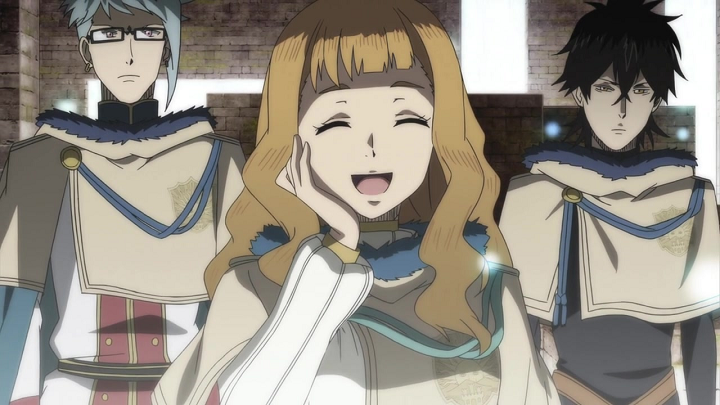
Much to my surprise, Black Clover actually does a rather good job of reinforcing this conflict. Early on it does so in incredibly trite ways, such as pity between peasants or outright discrimination from snobby Nobles. This happens so often, with almost every character we meet outside of the Black Bulls, that you will probably quickly tire of it. But as the series goes on Black Clover begins to explore it in interesting ways. We find Nobles who pity peasants out of a misplaced sense of duty to protect them. Nobles who were born weak themselves, despite their bloodlines, who must learn how harmful this caste system is. Even Nobles who don’t care a whit for it, viewing peasants and kings alike only by their achievements. Demanding that everyone must earn their respect through actions, rather than the luck of birth.
These characters are by no means a natural occurrence, not totally at least. Rather they are the result of the direct actions of the Wizard King, Julius Novachrono. A man who loves all things magic, regardless of the social standing of its users. He acts as our “Hokage” of the story effectively, the paragon all characters aspire to be. And he makes full use of this and of his position by appointing only those who align to his views. He seeks equality in magic not through sudden, radical change, but by slowly replacing the existing government with more understanding individuals. In this way he is the opposite of the Royal King, who represents and seeks to maintain the current order/”wealth” disparity. You can see how Black Clover’s core concept has started to work itself into every facet of the story, reinforcing it everywhere we go.
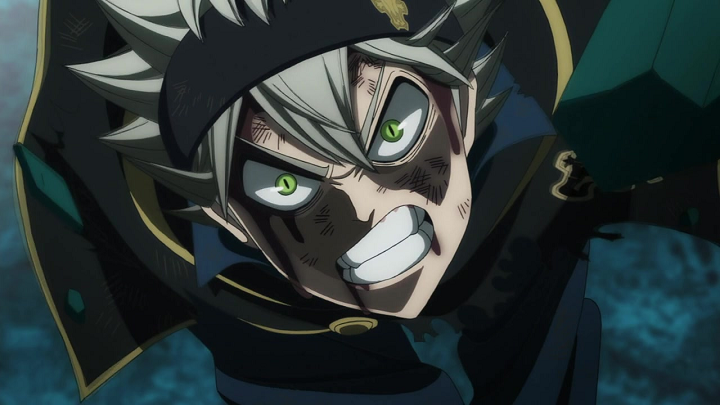
It’s this same conflict that sets up the history of this arc as well. Early on, and warning for light spoilers this paragraph, we learn that humans were not alone. Rather, they once shared this continent with Elves, who had vastly more magic than they did. And though there was a tentative peace, I am sure you can see where this goes. One thing led to another, we will talk plot details later, and the Elves are dead. The Humans are now the dominant magic users on the continent. Where once they were jealous of the Elves’ magic, now they maintain a rigid hierarchy based on the exact same thing. This once simple conflict of “Nobles vs Peasants”, of “Talent vs Hard work”, has expanded to encompass something more. To cover themes of perpetuating history, of learning from our past and of revenge. Slowly but surely, Black Clover finds depth.
With the setting of Black Clover explained, though there are many more minute details worth discovering, we can talk characters. From heroes to villains, all of the major characters in this first arc tie back into the same conflict we just discussed. And you need look no further than our lead character Asta for evidence. Asta is… Asta is a tough sell early on. Born with no magic in a world defined by it, he is your classic plucky underdog lead. Nothing about him early on is particularly unique, he has the same mindless optimism we see in every Shonen lead. If anything, Asta is more annoying than them because of just how loudly he shouts in the beginning. But as the Black Clover fans love to say, “It [he] gets better”. And not just because Kajiwara, the VA, tones down the screaming. Though he does do that.
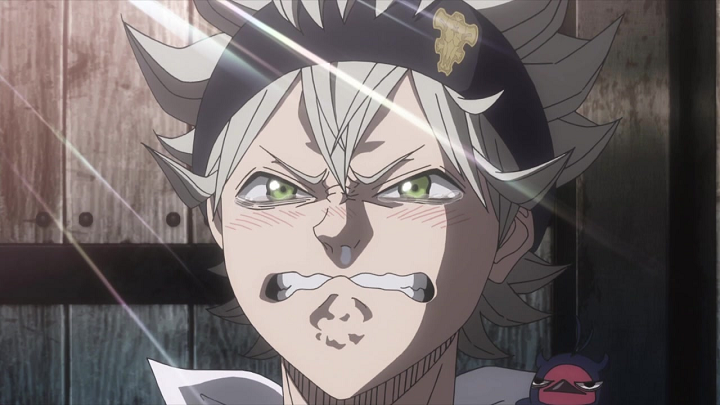
Rather, as the series goes on Black Clover does an admirable job of giving him character. There are arcs about being upstaged by his rival, Yuno. Of realizing how limited his anti-magic is and that it isn’t the automatic win we, dear reader, believed it to be. Of being denied respect despite his accomplishments purely because of his lack of magic. Don’t get me wrong, at the end of the day Black Clover is still a classic Shonen. Asta wins the day and generally finds some power up with which to do it. But Black Clover manages to preface these power ups with actual emotional character beats, making them feel earned. As an example, his biggest power up comes after an arc dedicated entirely to healing his arms that were thought forever broken, but he perseveres. It’s not Shakespearean by any means, but Black Clover puts in the legwork.
Moving past our lead character, we come to our supporting cast, and boy does Black Clover have a large one. 9 Magic Knight squads, each with their own captain and multiple characters underneath. To say Black Clover suffers from character bloat would be an understatement. Luckily a majority of them are largely irrelevant and exist for narrative dressing, so for now let’s focus on the important one: the Black Bulls. The Black Bulls are our “Nakama”, they are our Straw Hat crew, Black Clover’s 1-A. Every single member of the squad has a clearly defined personality trait and even their own arc, eventually. From Gauche and his sister complex to Best Girl Charmy’s eating habits, from Gordon’s creepy mutterings and… concerning character design to Magna’s “sidekick” syndrome. Every single one of them is recognizable and fills their own niche in the group. But that’s not always a good thing.
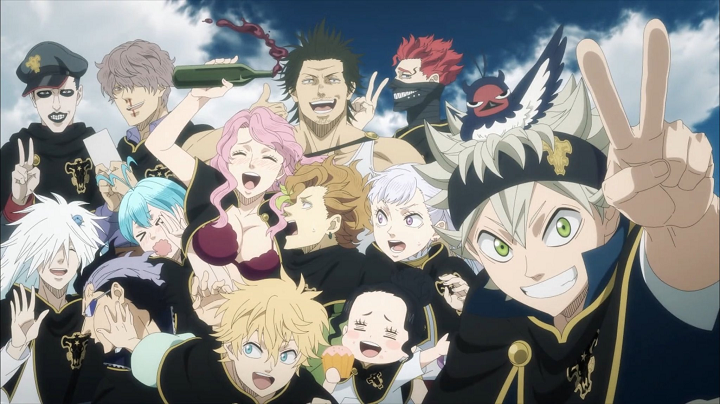
For all that I praised Black Clover’s use of Asta, the Black Bulls don’t get that treatment. Yes, they have their arcs explaining their personality traits. They are given reasons, and are actually decent characters inside their own arcs. But once a character’s arc is over they often fall back to their single core personality trait. This happens with Gauche a lot for instance. Introduced early as a sis-con, we eventually learn he is just an over protective big brother for his orphaned sister. We also get to see this overprotectiveness spread out to the rest of the Black Bulls as well, expanding who he cares about. But outside a few important scenes, his entire shtick continues to be played for laughs and poorly timed “Look at this picture” jokes. It’s similar with Gordon and his mutterings or Grey and her scopophobia. They revert to a collection of gag traits.
That said, there is one thing Black Clover does better than almost any other Shonen out there: Female characters. It would not be wrong to say that Shonen as a genre can be very… dismissive of its female cast. They are often relegated to simple love interests, exist for the fanservice or are simply not given the same attention as their male leads. You need look no further than My Hero Academia’s treatment of characters such as Uraraka, Nejire or Ashido for examples of this. I love the series, but Horikoshi cannot write female characters. Black Clover on the other hand does surprisingly well. Noelle, Mereoleona, Vanessa, these characters routinely have important character moments/progress, win fights or put up good showings without the lead character’s help at all. They aren’t perfect, but they stand on their own two feet more often than not.
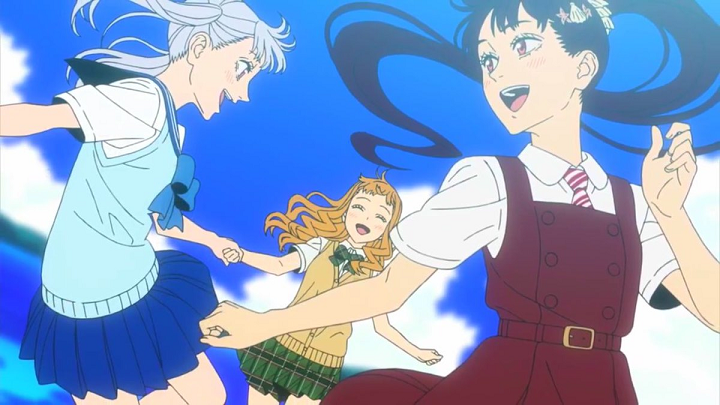
Still, even a collection of gag traits can be worth including when used well. And while I hesitate to say any of them are particularly “good” characters, I can say one thing: I really like their relationships. For all that they are often simple caricatures, Black Clover gives them time to themselves. The Black Bulls are allowed to bounce off of each other, to goof around, to hang out. They get to build their relationships and establish a rapport with each other. You could point to any two members of the Black Bulls and I could tell you how their relationship is unique from any others. Simply put, they feel like a family. A simple family, often lacking depth outside their specific arcs, but a family nonetheless. It’s as if Black Clover put all of its effort into its relationships, among both its heroes and its villains.
Speaking of villains, let’s talk about them. This section is filled with spoilers and covers both the villains and the first meta-arc of Black Clover. If that’s fine with you, or you already know what it’s about, read on. Otherwise let me give you a quick summary: This meta-arc effectively covers the first 120 or so episodes of Black Clover. It’s filled with a bunch of smaller arcs, from the Undersea Temple to the Royal Knights tournament. But every one of these arcs is done in service to a single overarching story, fueled by the same villains and the same core narrative. It’s rather impressive really. The narrative itself covers the history of the Elves and Clover Kingdom, the fallout of said history and the story of an Elf named Licht. Does any of that sound interesting? Well then read on, we have a lot to talk about.
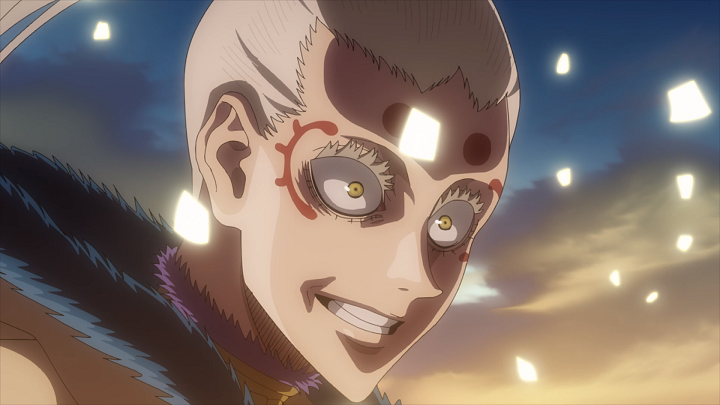
Click here to read spoilers about Black Clover’s narrative and villains!
So right away, who is Licht and what are his plans? Simply put, and saving a few twists for you to discover on your own, Licht is the reincarnation of one of the Elves slaughtered hundreds of years ago by the humans. In an act of genocide, he and his people were killed during a wedding to the human princess. And in a moment of desperation he turned to Forbidden Magic, invoking a reincarnation spell and becoming the Demon whose massive skull sits next to Hage village. His goal, now that he has returned, is to complete the reincarnation and bring back his people. Taking over the Clover Kingdom, slaughtering the humans and enacting his revenge for their deaths hundreds of years ago. And the best part of this is that even this description leaves out a myriad of details, of twists and turns and all around good stuff.
So how does this story arc manage to stretch across 120 episodes without feeling slow? The simple answer is it doesn’t, but we will get to pacing later on in this post. The more complex answer is: There are loads of things happening. You have the classic “gather the McGuffins” plot required to complete the reincarnation spell. You have various side arcs such as training, or healing team members, or the villains going off and doing something without the MC’s involvement at all. There is even a radical twist at the end revealing the true villain who had manipulated everyone into doing this all for their own schemes, and they were actually properly hinted at and alluded to from the very beginning. It’s not perfect, the narrative has bumps, it has ups and downs. But there was an ambition here that I can appreciate and did not expect.
All of that was to say that as a villain, Licht is pretty damn good. With this one meta arc Black Clover proved to me that it does have a plan. That the ideas established at the beginning, the themes and the characters, were plotted out from the start. No doubt it has changed and shifted to accommodate new ideas or opportunities, but this isn’t a simple “reset after every arc”. There are lasting consequences for everything that happens. The conflict between Elves and humans, the racial extreme of the same magical/wealth based conflict I talked about before? The mass slaughter and war that happened across the Kingdom over the course of the arc? Even at episode 150 these things still have fallout and are still relevant to the story. Black Clover’s world is reacting to its story arcs, and that’s more than I ever expected.
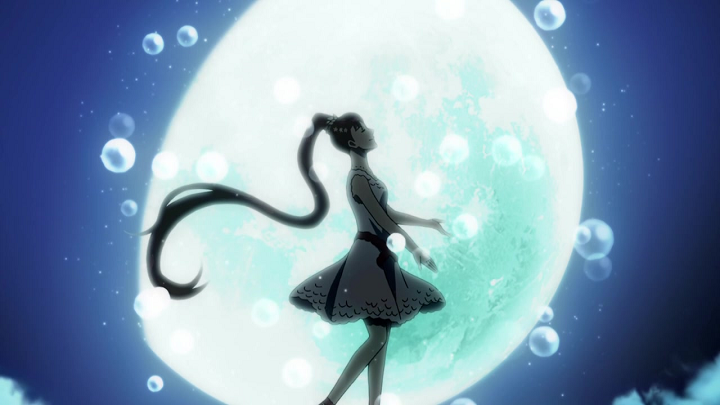
That said, there are a host of minor details I want to touch on before we move to what went wrong. As much as Black Clover’s narrative seems well thought out and prepared, its world is a hodgepodge. The Clover Kingdom can’t seem to decide if it’s medieval, pre-industrial, fantasy or some kind of modern. One episode people will be lamenting medieval living conditions, food or travel in a classical city, the next side characters will be talking about wanting to be Idols or buying swimsuits for the beach or what have you. Most of these are for gags yes, but they still contribute to this confusion. Black Clover seems to have figured that out a bit, has found its place. But the fact remains that these issues exist and that its world is not as fully realized as some of its contemporaries.
At the same time, Black Clover is also terrified to kill off any of its characters. One of the most impactful moments of the entire show, one where Licht reveals his grand plan, succeeds and kills an incredibly important character… is reversed basically. Oh sure, there are minor consequences, but at the end of the day the character got Dragon Ball’ed. It undercuts what was otherwise a fantastic sequence, narratively and visually, and the story is weaker for it. The same can be said of the villains who often end up alive, but captured, or eventually reformed. Many Shonen have this problem, and it hurts each and every one of them. If death has no meaning, has no finality in your story, then the tension disappears from it. The characters lose out on valuable progression through grief, etc. I can only hope the genre grows out of this one day.
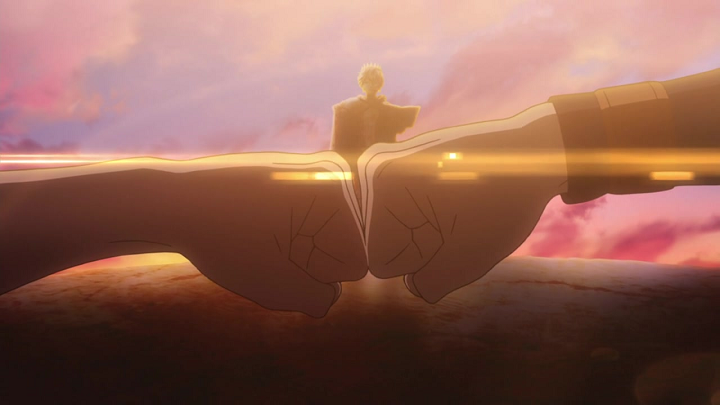
What went wrong?
So after all that I mentioned, what went wrong? Why does everyone seem to dunk on Black Clover, why did so many drop it? Looking only at the initial episodes for now, there are a number of reasons. To put it kindly, Black Clover’s first impression is not a good one. Between the initially generic writing and Asta’s first impressions as a character, Black Clover is a rough sell at the start. I remember being legitimately concerned for VA Gakuto Kajiwara’s vocal cords while watching the show for this post. The man was screaming non stop, it was infuriating. However, as I talked about above, the narrative certainly improves and finds its footing while Kajiwara learns to tone the screaming down substantially. So if the narrative improves and the main character is addressed, if the immediately off-putting aspects are resolved, why the continued derision? The answer is one word: Production.
To call Black Clover’s production a travesty would be a kindness. From episode one, the whole thing is just a mess. It’s as if Studio Pierrot just threw the series at director Tatsuya Yoshihara while giving him none of the resources to make it work. Don’t believe me? Let’s go over a few key positions in the animation pipeline and see how Black Clover was treated. Also for those interested in reading more you can do so at my sources which I am mostly paraphrasing here: The Anime Staff Blog, where tkROUT goes into far more detail regarding specific staff members and episodes, and Sakuga Blog, the home of all things Sakuga where kViN breaks down the production of episode 63. Now, on with the show!
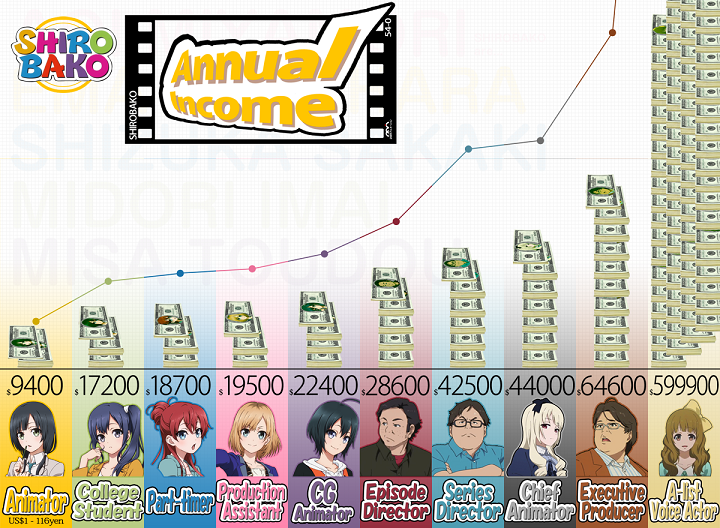
Let’s start off with the boots on the ground, the In-Between Animators, or “Tweeners”. These are the people who draw everything in between two key frames. This is typically left to junior artists or is outsourced to other studios, as it is repetitive and uninteresting work. Basically in a 24 fps show, the big guys draw the important frames and you are left with everything else. If you are animating “on ones” for some scenes, meaning full 24 fps rather than 12 fps with each drawing on 2 frames, then it’s even more work. As you can imagine this is an important, but thankless position. How does this relate to Black Clover? Simple, for at least the first year they had almost no Studio Pierrot in-house inbetweeners. You may be wondering, why does this matter if this is the most basic position? It’s simple: Experience.
Typically an in-house inbetweener will stick with the same team for an extended period of time. For long projects like Black Clover, it wouldn’t be unreasonable for it to be their first and last major inbetweening job. During this time they become familiar with the staff and the specific animators working on the project. They can talk directly with each other, get feedback, and train under the very people whose work they are inbetweening. With none of the inbetweeners being in-house though, to the point where even Director Yoshihara had to do some inbetween work at times, whoever they outsource to has none of this. It’s just a black box that gets sent key frames and sends out the rest of the animation. This in turn puts stress on the rest of the project staff and the problems balloon out from there.
Moving on we come to the Episode Directors, basically the middle managers of a production. Their responsibility is as it says on the tin, they direct individual episodes. They are responsible for coordinating with all the teams, meeting with them, checking layouts and basically being the final say on everything. So while Yoshihara, the director, may lay down constants that every episode director has to follow, everything else is usually left to them. Or at least that would be the case if Yoshihara hadn’t also acted as the Episode Director for most of Black Clover’s big early episodes. There were others of course, but not nearly as many as the series needed and few that were particularly talented at it. For the most part, Black Clover has been giving episodes to directors usually reserved for outsourced work rather than in-house.
And finally we come to the Production Desk. These are the people who focus on the schedule, deal with financing, assembling teams, and basically all of the behind the scenes non-animation related jobs that a series needs to function. Or at least, it would be if Black Clover had one. That’s right, after the second cour, Black Clover didn’t even have a Production Desk anymore. They had one prior, but for whatever reason they left. Why, I have no idea. But the fact remains that without them Black Clover was down a serious position. Imagine trying to create a series without someone focused entirely on schedules and finance, along with everything I listed above. It’s a wonder Black Clover managed to continue releasing at all, and I feel comfortable in saying it’s all thanks to the tireless work of one man: Tatsuya Yoshihara.
Now before I get into the man, the myth, the legend, I want to point something out. Everything I just said above is readily available from the sources I provided earlier, along with much much more. This post doesn’t go into sub-studios going bankrupt or circumstances regarding specific staff members, nor does it list specific episode numbers. The purpose of this post isn’t to copy verbatim from something that already exists. So if any of that interests you, if you want to know specifics about Black Clovers production, then please. Go to The Anime Staff Blog where every episode’s main staff is listed in exhausting detail. It’s truly an incredible resource, and they do it for Boruto along with prior series such as Dororo and Tokyo Ghoul. That reference out of the way, back to Yoshihara’s quest to drag Black Clover kicking and screaming out of mediocrity.
By now it should be obvious that Black Clover’s production was not what one would call… healthy. It lacked staff, it lacked resources and perhaps most of all it lacked passion. People were overworked and just barely keeping up with the schedule. All the while Yoshihara is publicly talking about his difficulty in finding everything from animators to supervisors – no one wanted to work on this. And then comes along Boruto episode 65. As the Sakugablog post by kViN which I linked earlier mentions, this seemed to have lit a fire under Yoshihara. A desire to do the same, to have his own big sakuga episode, for a series almost everyone had written off. The question then became, how?
If you are Yoshihara, you wait. You plot, you plan, you prepare a schedule unlike anything the series has had before. You gather your team, calling in favors, appealing to those whom you have worked with before and you go to Twitter and let a bunch of web animators have their professional debut on your show. Who cares about cohesion, who cares about unified style or models. Just let everyone go wild, do what they want and have fun. The worst has already happened, no one is expecting anything from Black Clover at this point. So Yoshihara had nothing to lose by letting the animators have free rein of the storyboards and their style. And the result? Utter madness. It’s not cohesive in the slightest, going from surrealist mind-scapes to wild blender action to watercolor exhibitions. But it is a statement: Yoshihara will not let Black Clover be ignored.
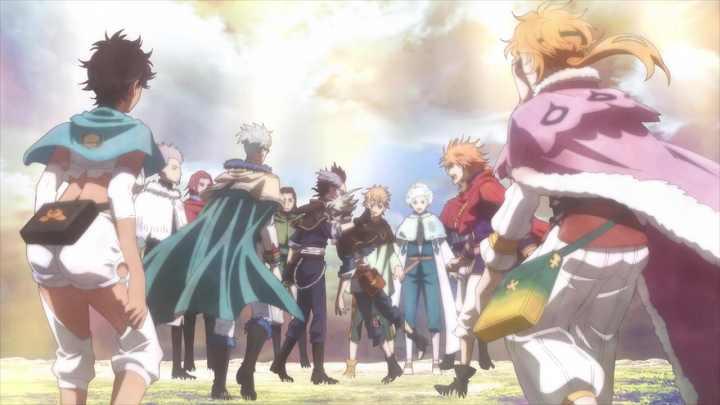
Does it get better?
This all brings me to the big question, and the reason for this post: Does it get better? Is there anything salvageable about this series, does Yoshihara pull it off, are the fans right?! The answer to that is a clear and firm yes, but it comes with a few caveats. Sure it gets better, but does it get good? Is it worth sitting through all 150+ episodes to get caught up with it and see where it goes? Where do you even begin? Well that’s what this last section, and I promise it’s the last, is here to answer.
I would say that yes, Black Clover does get good. I would never have been able to sit through 151 episodes to write this post if it hadn’t. Author Yūki Tabata clearly has a plan in place for Black Clover. The narrative makes that clear, and given where we are now I’m engaged, I’m enjoying it. The man even went through the trouble of writing additional story content for the anime that wasn’t present in the manga. All to flesh out ideas he either didn’t have time to put in the manga, or he felt were incomplete without it. In a way, the anime has anime-only canon content for the story, and that’s sort of incredible. It’s a far cry from the generic and shouty Shonen it was in the first few episodes.
Meanwhile the animation that I was previously lambasting? That has become much, much more consistent. It’s still a long running Shonen adaptation that has to put out an episode every week forever. But Black Clover is clearly in a much healthier place now. Character acting is actually allowed animation, minor fights are more than just slideshows and even small scenes are given their moments in the spotlight. The series even manages to give us a bit of sakuga every episode or 2 now, nothing crazy, but something to wow the viewer. To tide them over until the next massive spectacle. I have no idea if Yoshihara’s statement from episode 63 worked, if Pierrot actually gave him more resources, or if the pipeline is just that organized now. But between episodes 63, 84, 92-93, 100, 104, 151 and a few others, there’s a respectable amount of spectacle in it now.
I don’t want to oversell this of course, Black Clover is still a Studio Pierrot show. It’s still producing non-stop, releasing an episode every single week. There’s still jank, still filler and the staff is still getting shafted by the studio. Nothing will really fix this, short of shifting to the My Hero Academia release schedule, one season a year with the rest of the year to prepare and recover. But there is less jank, the pipeline is healthier than it was at the start and the overall production is still better. Just uh… be prepared for some weird stuff, and don’t get your hopes up too much on the production side. At least until the next Sakuga episode.
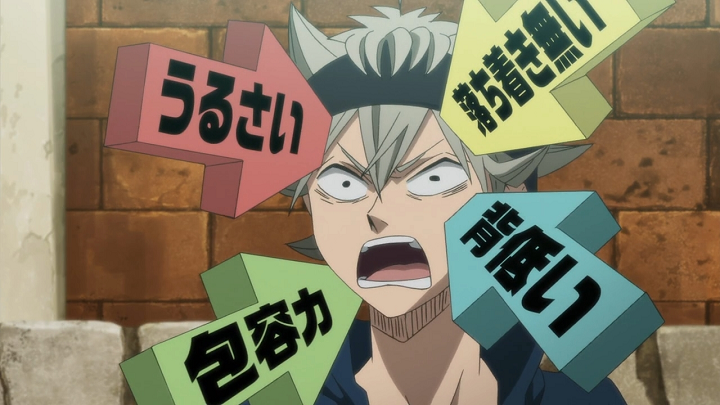
Sadly this brings me to the negative portion of this section. Despite its improvements, despite Black Clover’s current state… I can’t recommend you watch it. At least, I can’t recommend you watch all of it. Black Clover is simply not worth sitting through 151 episodes to get to where it’s good. The first 30 are more than enough to make people drop it and I can’t in good conscience recommend they force their way through that. Especially not with things like episode 60, the random filler that exists solely to fill a timeslot that week. But, while I can’t recommend you watch the whole show, I can recommend something else. That you skip it. That’s right, skip the start, get into the series now and see what it has to offer. And this is how we are going to do it…
First up, we skip right to episodes 123 and 124. This will give you a recap of all the major narrative events of the series for the first 120 episodes of the show. You’ll be primed and ready to understand everything moving forward. After that, if action is what you are into, we turn to the internet’s greatest resource: Youtube. I know, I know, fans want people to watch the whole series, but that’s simply not happening this deep in. Instead we are going to go with a highlight reel: Yami vs Licht, ep 35. Everyone vs Vetto, ep 49. Yuno vs Rill, ep 84, or alternatively start at episode 73 for the entire arc, it’s not bad. Licht vs Julius, eps 92-93. And finally, the grand finale in episode 119. Though the whole arc starting at episode 87 is a good ride as well.
With a large chunk of the series done, you are free to start watching from episode 125. There’s a bit of a lull between the end of the first meta arc and the start of the second, so don’t worry. You won’t be getting thrown right into the middle of a grand conflict. Rather, you get a couple episodes to become acquainted with all of the characters. To get to know them to make up for the 123 episodes we skipped. There’s some decent action in here, but it’s mostly setup for the next big arc and some filler while the manga widens the gap. It’s not fantastic, but it’s leagues better than the first 30 episodes. And most everything after 143-144 is actually pretty good. Who knows, if you end up liking all of this, maybe you will want to go back and watch what we skipped!
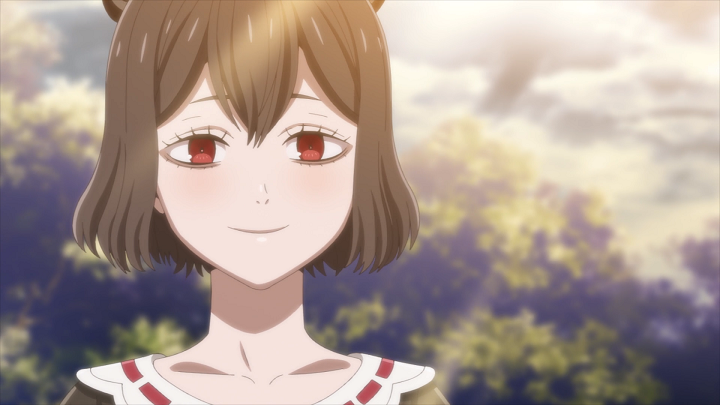
Final Thoughts
Whew, that was a post. Thanks for sticking around to the end! I know this isn’t my usual kind of post, but I wanted to try and do something new. Spread my wings a bit and go beyond just commenting week to week on seasonal stuff. It was a lot of work, watching 151 episodes, double checking facts to give Black Clover its due diligence and researching production woes. It was fun though, worth the time. At the end of the day I don’t expect this to change many people’s minds on Black Clover. The series has aired for 3 years now, anyone interested would have already tried it. But hopefully it got you at least a bit interested in what’s going on, and gave you a new director to look out for.
See you next time, and if you have any ideas for this kind of thing, shows or posts you’d like to see me tackle, give me a holler down below! I’d love to hear them and I would love to know what you think, know how I can do better.

this was great
Thanks! It was a lot of interesting work.
Can’t the suggestion of reading the manga until you skip the bad parts of the show also work?
I suppose so, though I haven’t actually read the manga, I restricted myself entirely to the anime for this post, and didn’t want to recommend something I had 0 experience with. I do think the manga is more of a time investment though and might work against getting people into the series. I also think going the pure manga route would rob you of some pretty good fights/scenes.
Hmm, maybe I should give this a try…with the condensed viewing guide you wrote up. How is the series strategy-wise? I don’t find myself really liking a lot of shounen shows, but the ones I do usually are character-driven and/or have a lot of strategy involved. My favorite one is Yuu Yuu Hakusho (I’ll get around to watching Hunter x Hunter one day), but I also liked Yakusoku no Neverland, Haikyuu, Death Note, and a few others.
It’s fine I would say. I wouldn’t compare it to the others, you aren’t going to find anything as cerebral as Light vs L’s battle of the minds, or Haikyu’s focus on on specific team roles.
There are definitely some fights, such as the Vetto fight where you have 3 people putting their powers together to defeat a superior opponent. Or the occasional bit of one persons magic being a better counter than anothers, Light magic vs Mirrors for instance.
But at the end of the day its still a pretty straight forward battle Shonen. People get power ups and even if they are narratively justified a fair bit of the time, they are still straight power level increases. Based on what you have said I don’t think the series as a whole will work out for you, not enough to be worth watching week to week.
Though you will probably find some enjoyment in the highlight reel.
First of all, this was a great article. I really enjoyed reflecting on 3 years of watching Black Clover while comparing your thoughts to my own.
To be honest I don’t really know why I never dropped Black Clover somewehere along the way and kept watching week after week for the majority of its run. Sometimes I stopped watching it for a month or two, fatigued by subpar animation, dialogue that made my ears bleed and countless other production issues that usually compell me to drop a show many times over, but I still ultimately kept watching.
Even after having decided to finally stop watching in january 2019 I picked it up eventually in october of the same year, bingeing some 40 episodes over a weekend. And for some reason I actually enjoyed it and honestly somewhat missed ruining my tuesdays 8 out of 10 times watching this show.
At the beginning I kept watching because one episode a week was doable, while later I kept hanging on for those few minutes where it was obvious 90 percent of that seasons budget and manpower went into. Moments like this made me lament what the show could have been if the show had the budget and attention from the start.
Black Clover isn’t an amazing show by any means and even I with trash taste in shounen have to admit that it’s not worth watching all 150+ episodes if you value your time and mental health at all. Yet in these past three years of silently suffering through hours of this show just to glimpse at what could have been every 5 episodes or so I never really regretted sticking with it. After all this time the show grew on me and for some reason I really don’t want it missing from my tuesdays anymore.
Thanks for giving Black Clover some attention. I thoroughly enjoyed reading your thoughts and your findings about the shows production and why it turned out the way it did. You said you probably won’t continue this format, but should you ever decide to continue it I’d gladly read it.
(please excuse any mistakes or hard to understand parts, english isn’t my first language and I’m writing this at 2am after catching up on Black Clovers recent arc lol)
No problem on the English, it read well enough!
Thanks for taking the time to read what is a really long post. I’m glad you enjoyed it, I had fun writing it, especially the production pipeline bits. I might do more of this in the future if I can find other good topics for it. I just don’t want to imply this will be a regular thing. It was easily the most work-intensive post I have ever made and I can’t binge 150+ episodes often enough to churn these out. Not and keep them well made at least.
I agree, there was definitely something about Black Clover that kept me watching through the jank. There is a heart to it, a plan, that shines through Pierrot’s terrible production pipeline. And seeing Director Yoshihara time and again try to make this series into something unique and incredible was a joy.
When this anime first started, I watched 3 episodes and just gave up. I could not for the life of me get past Asta’s screaming. After reading your post, and of course being stuck at home during a pandemic, I decided to give it another try. For me, the anime became tolerable after episode 13 and I’m now on episode 28 (fillers). I don’t think I’ll skip the episodes and jump right to 100+. Thanks for the post!
Glad it worked out! I was basically in the same boat with dropping it and the pandemic. Looks like it worked out for both of us.
And if it picked up for you as early as 13 then I think you will quite enjoy the latter half. By then the production has started to stabilize a bit and the narrative has gotten in full swing. Make sure to stop by and tell me how the rest goes for you!
I really do not know why people just assume shonen has a lack of strin9g female leads. Gintama, Bleach, OP, Chainsaw Man and BOku no hero have plenty of well written females. Some get better over time (Ochako and Momo). People just do not look hard enough.
Having seen all but Gintama on that list, they uh… really dont.
Bleach: Orihime and Rukia act as hostages for the entirety of their respective arcs and are largely relegated to side fights and being saved. Rukia has the occasional fight on her own, but they are largely irrelevant or she gets saved by Ichigo or her brother
One Piece: Nami and Robin are literal jokes. Again, neither of them are particularly important and often play 2nd fiddle to their male counter parts. Like… theres a reason Oda only really knows how to draw one body type on women, and thats the X and 2 O’s.
Chainsaw Man: Newish, its alright. Makima and Power are definitely on the better end, I will give you that.
Boku no Hero Aca: Possibly the worst on this list. Uraraka, Momo and Ashido all get shafted pretty often when it comes to their personal arcs. Just look at the most recent one where Ashido has her moment to shine in the big battle with the tranq stuff, only to fail and have to be saved by Kirishima. Uraraka similarly never really moves past “I like the MC because I am the female love interest” while Momo is a background character 90% of the time.
I am Shonen trash. I watch/read a lot of Shonen. I know very well what the state of female characters in the genre is and let me tell you, its not good. Its not even that I dislike these series, with the exception of Chainsawman which I think is overrated, I enjoy OP/Bleach/MHA/Naruto, etc. But the female characters take the back seat to the leads in most of those rather than standing side by side with them.